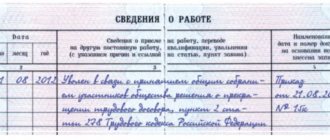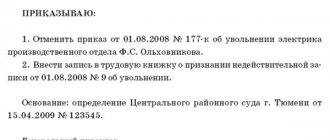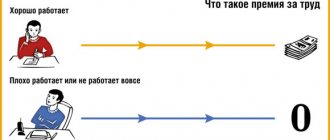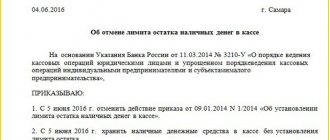The procedure for bonuses to the general director always raises many questions among personnel officers and accountants. The director (general director) is the executive body of the company, appointed by the meeting of participants and shareholders (Article 69-1 Federal Law-208 dated 12/26/95, Article 40 Federal Law-14 dated 02/08/98). An employment contract must be concluded between the participants of the meeting represented by its chairman, an authorized participant, and the director (Article 275 of the Labor Code of the Russian Federation), and the conditions of labor relations must be fixed. Bonuses are awarded on this basis. What is the procedure for processing such transactions? Is it possible to reward a director – the only participant in the company? How to correctly make entries and include amounts in income tax expenses? All the nuances of director bonuses are in our material.
Director's bonus: tax evasion or adequate incentive ?
CEO Award – Reasons
The general director is the same employee of the organization as ordinary employees, however, his leadership status determines some features in the bonus procedure. Let's start with the fact that the CEO, of course, has the right to receive a bonus, if there are grounds for this.
In this article, the general director is understood as any person who performs the functions of the sole executive body of the organization - general director, director, president, etc.
The head of the organization himself does not have the right to reward himself. His employer is the founders of the company, who enter into an employment contract with the director.
The procedure for bonuses is not defined by the Labor Code, however, the Labor Code of the Russian Federation allows you to regulate the procedure at the local level, in each specific company. The procedure for rewarding a director can be established both in the employment contract with him and in the local acts of the company, collective agreements and agreements.
Any incentives for the general director are paid exclusively with the consent of the founders or their authorized persons. To reward the CEO, they must make an appropriate decision.
Thus, the basis for bonuses to the general director is an administrative decision on this issued by the employer.
If the general director simultaneously acts as the sole founder of the company, he has the right to reward himself. This is due to the fact that in such a situation the general director is simultaneously both the employer and the head of the organization.
Reflection in accounting
The source of bonuses, indicated in the documents regulating the payment to the manager, determines the correspondence of the accounts. The bonus associated with production efficiency is included in the costs of ordinary activities: Dt 44, 26 Kt 70 (PBU 10/99 clause 5.8). Non-production bonuses, for example, for a professional holiday, are included in other expenses: Dt 91/2 Kt 70 (ibid., clause 11). Bonuses from net profit, annual, are reflected by posting Dt 84 Kt 70.
AT NU:
- the bonus from net profit is subject to income tax, but is not taken into account as expenses (Articles 270-1, 208-6 of the Tax Code of the Russian Federation);
- bonuses during the year are not included in NU expenses unless they are mentioned in the agreement with the manager (Article 270-21 of the Tax Code of the Russian Federation) and were calculated for indicators not related to work activity (Article 255-2 of the Tax Code of the Russian Federation);
- bonuses due to special financing, target amounts are also not reflected in expenses (Article 270-22 of the Tax Code of the Russian Federation).
Is the payment of a bonus to the head of a state unitary enterprise recognized as an expense for income tax purposes (clause 2 of article 255 of the Tax Code of the Russian Federation)?
Results and conclusions
Giving bonuses to the CEO without the knowledge of the founders is illegal. Permanent bonus payments to management must be included in the employment contract, LNA of the company. One-time bonuses are related to the decision of the meeting of participants. The director, being the only participant in the company, does not have the right to receive bonuses on the basis of his own order. The decision of a single participant is required.
In accounting, the bonus is reflected in connection with the source of its payment, on the credit of account 70. In NU, the bonus cannot be reflected in expenses if it is not fixed in the employment agreement with the director. A bonus from net profit does not increase expenses; similarly, bonuses from targeted revenues.
Regulations on bonuses for the General Director
The bonus to the general director, as already mentioned, can be established by internal regulations of the company. Most often, the Regulation on bonuses is adopted (in the form of a local act), which clearly reflects in what cases, in what volume, for what merits, and with what frequency bonuses are paid to the director.
There is no legally approved form for this document. In this regard, the Regulations are adopted in an arbitrary form.
The document may reflect the following points:
- The procedure for paying bonuses.
- Grounds for accrual and payment of incentives (for example, for fulfilling a work plan, concluding lucrative contracts, etc.).
- The procedure for calculating the amount of bonuses, or an indication that the incentive is paid in a fixed amount.
- Procedure for deprivation of incentive payments.
- Frequency of bonuses.
- The procedure for reducing the size of premiums.
Errors in calculation and accrual, employer's responsibility
Many employees who are planning to resign at their own request are interested in whether an annual bonus is due after dismissal.
Modern legislation does not provide for the mandatory payment of bonuses after the dismissal of an employee. In order for an employee to receive money, numerous conditions must be met. Therefore, many employers argue that they have every right not to pay a bonus after dismissal.
However, employees who have not violated internal regulations can still count on payment of the required subsidies after official settlement. In this case, the funds must be accrued by the employer in full.
The annual bonus after the dismissal of an employee can be accrued immediately after the issuance of compensation contributions for unused vacation. The organization's accounting department is obliged to proportionally recalculate the due compensation payments. In most cases, the employee receives additional amounts.
To expect to receive a payment, you need to know how the principle of paying bonuses after the employee has been calculated is stated in the internal documents of the enterprise.
In the process of calculating average earnings, quarterly and annual bonuses are often taken into account. It is important that additional payments are accrued in the billing period.
This requirement is specified in paragraph 15 of the Regulations, which was approved by Decree of the Government of the Russian Federation of December 24, 2007 (No. 922). If the employee has not fully worked the pay period, annual and quarterly bonuses are taken into account by the accountant in full to determine the amount of average earnings.
It is important that a number of certain conditions are met:
- the period for which the payment is calculated must be included in the settlement period;
- Bonuses are accrued for actual time worked in the bonus period.
If the employee has worked the pay period in full, bonuses are included in the calculation, regardless of whether they are included in the worked period. This requirement is stated in paragraph 5 of clause 15 of the Regulations.
When paying a bonus to an employee after dismissal, he may be paid either less or more money than expected. As a rule, this happens due to incorrect calculations by the accounting department.
If the employee received less than the required amount, the employer can make another payment. However, in this case, insurance and tax will be paid in two payments.
If the company has paid excess funds and the employee does not want to return them, justice can only be restored through the courts. In this case, you will have to prove the mistake made by the accountant in the calculations.
If the situation is the opposite, and the employer completely refuses to pay the due bonus after dismissal, he must remember the liability that he may incur for non-payment (according to parts 1 and 2 of Article 5.27 of the Code of Administrative Offenses of the Russian Federation).
Expert opinion
Irina Vasilyeva
Civil law expert
Before going to court, it is advisable for the employee to try to resolve the issue peacefully.
The right to bonuses is stipulated by a number of local documentation:
- Collective agreement.
- Regulations on remuneration.
- Regulations on bonuses.
- Employment contract.
If bonus payments are specified in one of these documents, then the employee can count on receiving them, but subject to mandatory consideration of the conditions specified in the LLP.
A monthly bonus is usually paid before dismissal, along with other compensation benefits. But even here there may be variations, if bonuses imply a monthly calculation of profit and the establishment of a percentage depending on the value of this indicator, then it is quite possible that the chief accountant upon dismissal will not be able to calculate it without having data.
If quarterly and/or annual bonuses are provided, the law obliges the employer to make settlements even with those employees who were already dismissed earlier, because in fact they were directly related to the profit for the specified period.
Premium payments for a quarter or year are paid after the specified period. This is due to the need to prepare all documentation for the past period and calculate the possible percentage of incentives for well-coordinated work. Of course, this approach does not make it possible to pay these amounts upon dismissal, so they are paid in the same way as to main employees.
The bonus amount is calculated as follows:
- The total premium percentage for the specified period is determined.
- The total income of the employee for the specified period is calculated.
- If the quarter or year was not fully worked, then only the number of months that were fully worked is paid.
- The payout percentage is multiplied by the actual income to obtain the incentive amount.
- Personal income tax of 13% is deducted from the amount received.
However, such a calculation will not be final. The accrual of bonus amounts for the past period automatically increases income for the past year, which immediately affects the amount of compensation for unused vacation. Upon dismissal, the estimated amounts are calculated based on the funds actually earned over 12 months.
When calculating quarterly or annual amounts, the previously taken income automatically increases, which makes the previously made calculation of compensation incorrect. For this reason, together with the calculation of the bonus, the employer is obliged to recalculate the amount of estimated compensation, as well as deduct income tax from the difference to the state budget.
If we operate with the norms of the Labor Code, then it is impossible to refuse to pay bonuses to a dismissed person. Labor legislation establishes only one limitation for such accrual - the correspondence of payment to time worked. In practice, obtaining quarterly or annual amounts is not so easy.
The employer may refuse payment if:
- The collective agreement or bonus regulations establish that incentives are given only to those who have worked the entire required period. In this case, having worked only 11 months out of the year, the employee will be deprived of the right to receive bonuses.
- Payment of bonuses is specified in local documentation as stimulating. This fact implies that incentives are given for the period worked, but only to currently working employees, in order to stimulate their work processes.
The reasons may not be documented. Therefore, each individual case of non-payment requires separate proceedings.
11.08.2018
Upon termination of an employment contract, the employee must be given all documents and funds due by law.
Most problems begin when an employee claims additional benefits that are provided under certain conditions.
Not only the employer, but also the dismissed employee should know how the bonus is calculated correctly in case of voluntary dismissal and who is entitled to it, in order to prevent the possibility of deception on the part of the former boss.
We invite you to read: Tax amnesty for individual entrepreneurs: who will have tax and contribution debts written off in 2021
Is it paid?
Most organizations apply a reward system in the form of bonuses for the work done by employees. There are several types of awards:
- annual;
- quarterly;
- collective;
- individual.
Only those employees whose employment contracts include clauses on mandatory bonuses or this right is specified in the organization’s regulations can apply for bonus payments.
In the case of collective incentives, the bonus must be awarded to each employee, regardless of the method of work (part-time, with a fixed-term contract, during a probationary period). In such a situation, non-payment of funds is possible only in the absence of profitability of production.
Payment of a bonus to an employee must be made together with other funds before terminating the employment contract. If the company’s labor, collective or other types of agreements provide for the payment of at least one type of bonus, then the employer is obliged to make a full settlement with the person who has already lost his job.
That is, on the last working day, a person must be paid not only wages and compensation, but also a bonus, the amount of which is calculated individually for each employee.
Sample of filling out a pay slip - front side Sample of filling out a pay slip - back side
Accrual conditions
Termination of a contract with an employee does not eliminate the need to issue funds even after dismissal. At the legislative level, there are several conditions under which a person can count on receiving cash payments:
- proven fact of the person’s work during the period when bonuses are accrued;
- compliance by the employee with the conditions stipulated by both collective and individual agreements;
- conscientious fulfillment of work obligations and the absence of disciplinary sanctions reflected in the company’s acts;
- the presence of merits or achievements for which incentive payments are awarded;
- the absence in any agreement of a clause on the deprivation of bonus payments to the employee upon termination of the contract.
In case of litigation, many courts also take into account the fact of payment of funds dedicated to memorable dates or holidays. If these conditions have been met, then the employee must be paid bonuses even after termination of the contract.
Reasons for refusal
There are several circumstances in which an employer may legally not pay a bonus:
- if in any type of agreements or internal acts of the organization there are restrictions on the accrual of bonus payments to an employee with whom the contract was terminated;
- if the employee was subject to disciplinary action, fines or other liability for improper fulfillment of labor obligations for the period when the bonus was calculated;
- if the work for which incentive payments are accrued was performed incompletely;
- if a person violated the terms of a previously concluded contract, for which he was disqualified;
- if the bonus payment is made in honor of a significant date or holiday that took place after dismissal;
- if a person does not have documents that could confirm the fact of working at the enterprise.
Decision on bonuses for the general director
Bonuses for the general director, as already mentioned, are carried out on the basis of the decision of the founders. Such a decision is made at the general meeting and is included in the minutes of the general meeting.
If there is only one founder, not a protocol is adopted, but a decision.
The minutes of the general meeting indicate the following data:
- Title of the document.
- Date and protocol number.
- Information about the persons who were present at the meeting, including information about the secretary of the meeting and its chairman.
- About what issues are on the agenda. Only one question can be raised - about bonuses for the general director, or several questions, including unrelated ones.
- About the voting results on the issues put on the agenda.
- About the decision made (on the payment of the bonus, indicating the amount to be accrued and the deadlines for its transfer).
After adoption, the minutes of the general meeting are signed by the meeting participants, the chairman and the secretary. After finalization, the contents of the protocol are communicated to the General Director.
Features and differences
The director is an employee, like all other employees of the company. The difference from them lies in the special procedure and his appointment/removal from office, as well as in his job responsibilities. The director, like everyone else, has the right to receive a bonus based on the results of his work.
The director is an employer in relation to other employees, but is not an employer for himself. For him, the employer is society. Only a meeting of participants can make a decision on bonuses to the director (Article 40 No. 14-FZ).
The main difference between bonuses for a director and a worker is that the director has the right to assign additional remuneration to an ordinary employee, but not to himself.
How to pay a bonus to a director
After preparing the above documents, they are transferred to the accounting department for execution. It is recommended that the order reflect the deadlines for calculating bonuses. They can also be enshrined in the Regulations on Bonuses. In this case, there is no need to additionally specify them in the order.
You can transfer the bonus either to the employee’s card or hand it out. Depending on this, the accountant fills out various forms of statements. The bonus can be accrued at any time, since the provisions of Part 6 of Art. 136 of the Labor Code of the Russian Federation does not apply to bonuses.
***
Thus, the general director can be awarded bonuses in the manner reflected in the employment contract with him, or in the Regulations on bonuses, which are adopted in the form of a local act, a collective agreement, or an agreement. In order to make a payment, a decision of the company’s founders and an order are required.
Who rewards the director?
The employer is responsible for bonuses to employees. And if for ordinary employees this is the director, then for the manager the employers are the founders of the organization. For this reason, the director cannot give bonuses to himself (Part 2 of Article 135, Article 191 of the Labor Code of the Russian Federation).
Exceptions are allowed if:
- The director is the sole founder of the organization.
To pay the bonus to himself, the participant formalizes the decision of the sole founder. The sole founder cannot take into account the costs of paying himself wages when taxing (Letters of the Ministry of Finance of Russia dated 02/19/2015 No. 03-11-06/2/7790, dated 10/17/2014 No. 03-11-11/52558).
- The director is responsible for paying bonuses to all employees.
OSNO and UTII
If an organization applies a general taxation system and pays UTII, it is necessary to keep separate records of bonuses to the manager for different types of activities. Bonuses accrued for achieving specific indicators are expensed for the type of activity to which they relate. If the bonus is paid for the overall results of the organization’s work, it must be distributed (clause 9 of article 274, clause 7 of article 346.26 of the Tax Code of the Russian Federation).
This is due to the fact that when calculating income tax, expenses associated with activities on UTII cannot be taken into account.
Personal income tax and insurance premiums
Regardless of what taxation system the organization uses, calculate personal income tax on bonuses to the manager (clause 1 of Article 210 of the Tax Code of the Russian Federation). For the amount of premiums, add contributions to pension (social, medical) insurance and contributions to insurance against accidents and occupational diseases. This rule applies regardless of whether the bonus is provided for in the employment contract or not (part 1 of article 7, article 9 of the Law of July 24, 2009 No. 212-FZ and part 1 of article 20.1, article 20.2 of the Law of 24 July 1998 No. 125-FZ).








